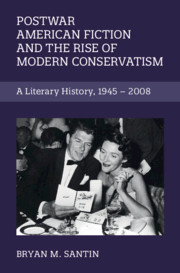Book contents
- Postwar American Fiction and the Rise of Modern Conservatism
- Cambridge Studies in American Literature and Culture
- Postwar American Fiction and the Rise of Modern Conservatism
- Copyright page
- Dedication
- Contents
- Acknowledgments
- Introduction
- Chapter 1 US Literature and the Modern Right at Midcentury
- Chapter 2 The Conservative Movement’s Foundational Fictions
- Chapter 3 The Strongbox of Custom
- Chapter 4 Movement Conservatism, Neoconservatism, and the New Right
- Chapter 5 The American Novel and the Reagan Revolution
- Epilogue: The Curious (Conservative) Case of Marilynne Robinson
- Notes
- Bibliography
- Index
- Cambridge Studies in American Literature and Culture
Chapter 3 - The Strongbox of Custom
James Baldwin, Norman Mailer, and the Shifting Racial Logic of Postwar Conservatism, 1955–1972
Published online by Cambridge University Press: 27 March 2021
- Postwar American Fiction and the Rise of Modern Conservatism
- Cambridge Studies in American Literature and Culture
- Postwar American Fiction and the Rise of Modern Conservatism
- Copyright page
- Dedication
- Contents
- Acknowledgments
- Introduction
- Chapter 1 US Literature and the Modern Right at Midcentury
- Chapter 2 The Conservative Movement’s Foundational Fictions
- Chapter 3 The Strongbox of Custom
- Chapter 4 Movement Conservatism, Neoconservatism, and the New Right
- Chapter 5 The American Novel and the Reagan Revolution
- Epilogue: The Curious (Conservative) Case of Marilynne Robinson
- Notes
- Bibliography
- Index
- Cambridge Studies in American Literature and Culture
Summary
Focusing on the major writings of James Baldwin and Norman Mailer, this chapter argues that the interpretative horizon of their works is inextricable from the emergence of modern conservatism as a cultural and electoral force. Whereas movement conservatives in the 1950s tended to stress tradition-based hierarchies and organic social order over abstract theories of individual liberty, conservatives began to shift their emphasis in the mid-sixties toward the language of unadulterated patriotism, property rights, and colorblind individualism. In this next stage of their movement, conservatives embraced an ideologically rigid fusion of laissez-faire capitalism and cultural populism that would redirect perceptions of literary value and prestige within American conservatism toward certain conservative strands of New Journalism and, in later years, toward the one-dimensionality of mass-market genre fiction. Finally, conservatives emphasized the “liberal cultural elite” trope with renewed vigor, constructing a monolithic stereotype of white liberal intellectuals whose racial guilt fueled their appetite for difficult, morally complex literature, a form of moral masochism that conveniently helped those same white liberals accrue “hip” cultural capital.
Keywords
- Type
- Chapter
- Information
- Postwar American Fiction and the Rise of Modern ConservatismA Literary History, 1945–2008, pp. 92 - 137Publisher: Cambridge University PressPrint publication year: 2021

